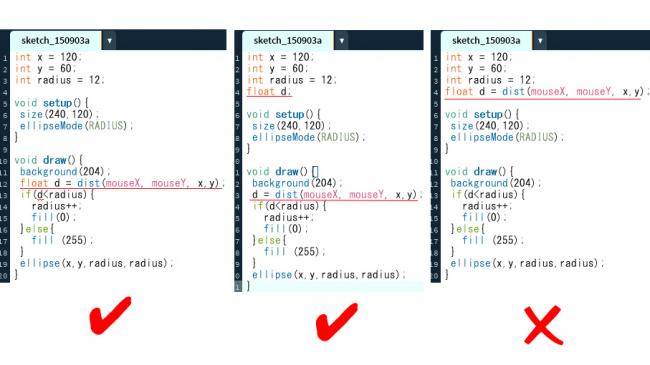Howdy, Stranger!
We are about to switch to a new forum software. Until then we have removed the registration on this forum.
Categories
- All Categories 25.7K
- Announcements & Guidelines 13
- Common Questions 30
- Using Processing 22.1K
- Programming Questions 12.2K
- Questions about Code 6.4K
- How To... 4.2K
- Hello Processing 72
- GLSL / Shaders 292
- Library Questions 4K
- Hardware, Integration & Other Languages 2.7K
- Kinect 668
- Arduino 1K
- Raspberry PI 188
- Questions about Modes 2K
- Android Mode 1.3K
- JavaScript Mode 413
- Python Mode 205
- Questions about Tools 100
- Espanol 5
- Developing Processing 548
- Create & Announce Libraries 211
- Create & Announce Modes 19
- Create & Announce Tools 29
- Summer of Code 2018 93
- Rails Girls Summer of Code 2017 3
- Summer of Code 2017 49
- Summer of Code 2016 4
- Summer of Code 2015 40
- Summer of Code 2014 22
- p5.js 1.6K
- p5.js Programming Questions 947
- p5.js Library Questions 315
- p5.js Development Questions 31
- General 1.4K
- Events & Opportunities 288
- General Discussion 365
Where to declare/initialize
Hi,
I've just started processing.
I can't understand where to declare and where to initialize variables.
Here is a specific example of what I'm asking about.
If global variables were effective over the whole program tree, why can't I declare and initialize "float d" at the same time as a global variable? (just like int x=120, int y=60, int radius=12)
 I'm not a native English speaker, so if my question is not clear, please let me know.
I'm not a native English speaker, so if my question is not clear, please let me know.

Answers
On the left, you have a local variable that is created new every time draw runs. You can not access the value of d outside of draw, and once draw ends, the variable is gone.
In the middle, you have a global variable, In draw, you assign this global variable a value, which changes as the mouse moves, and it updated every time draw runs.
On the right, you have a global variable again, which stores a single value. This time, however, the value is never updated once it is set! The variable is not "re-computing" the expression you've "assigned" to it - you assign it a value, not an expression. This isn't what you want.
If you want to use d in other functions, go with the middle.
If you don't, go with the left. Or, forget about using d entirely, and compare dist(mouseX,mouseY,x,y) with radius directly:
In 3rd picture the other variables are constants, so their value is known by the compiler when it sees them. Line 4, however, is calling a method to set the value so the value isn't known, isn't constant.
In the first picture, d isn't global, it is scoped to draw () and only available within draw ().
In the second picture, d does have global scope and is available everywhere.
In general it's a good idea to limit a variable's scope as much as possible, keeps things neat.
the line
d = dist(mouseX...............must be in draw()
it is not enough to call it once;
you must call it again and again (this is what
draw()does).Remark
so
d = dist(mouseX...............isa one time command you have to call again and again
it is not a standing order or a rule that the sketch would automatically do forever once you said it
as has been said.
;-)
ah, beaten to it by TfGuy44. in my defence it was 5:25AM where i was 8)
Thank you all. So, commands in the global field are processed only one time and I can't assign variables to variables in the field.(not sure this sentence makes sense) I think the problem is solved! :)
well 1st part is correct (commands only once)
2nd part is wrong (about the assignement)
;-)
besides, nobody says field vars (except gotoloop), they are global vars.
Oh, the second part is wrong!? I'll go over again. Thanks ;;)
As GoToLoop pointed out
This perfectly true in Processing they are generally called global variables. in Java they are called fields or attributes.
Since the Processing language is based on Java then all 3 terms describe the same thing.
Thank you, quark. I had totally mixed up those expressions.